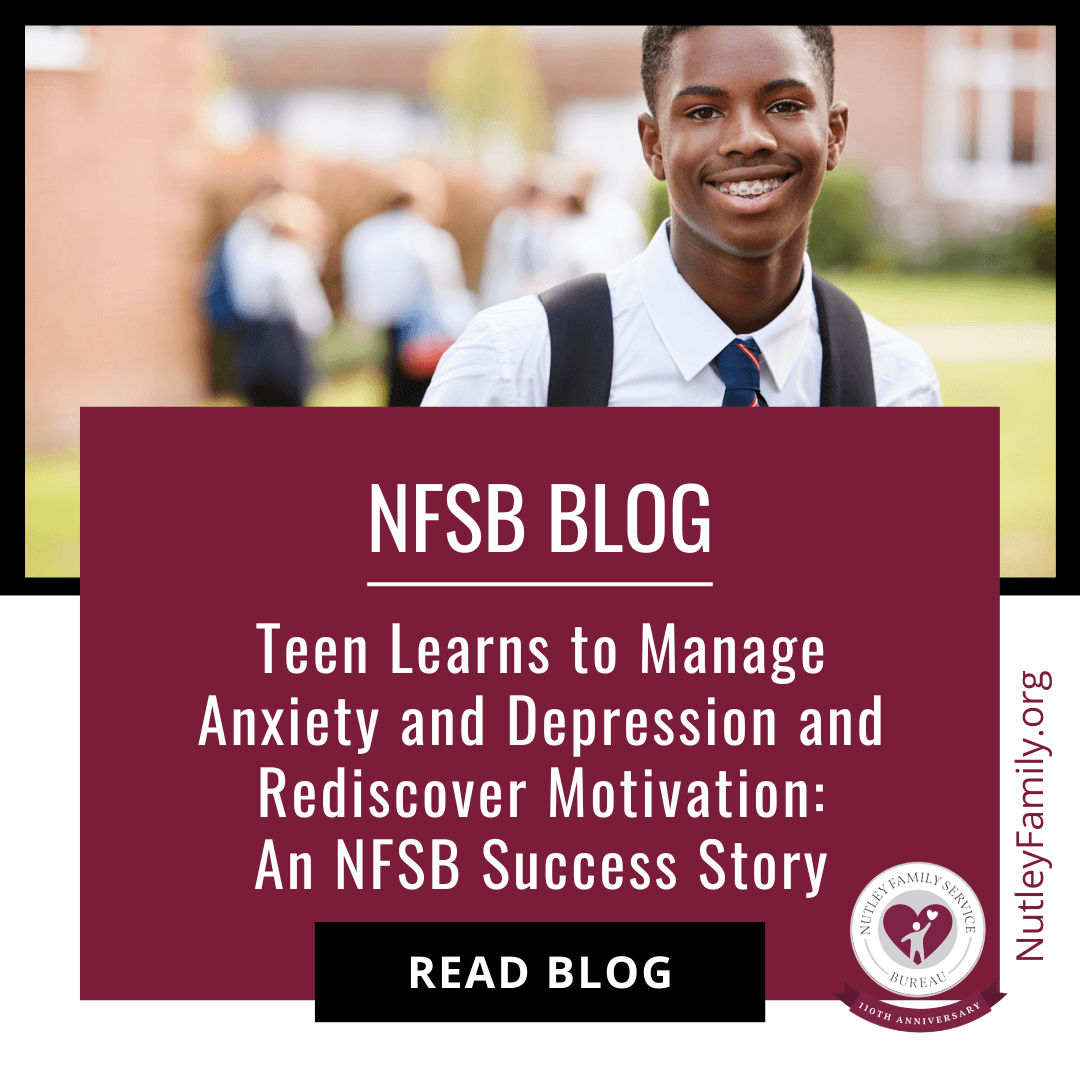-
Teen Learns to Manage Anxiety and Depression and Rediscover Motivation
- Posted on November 21, 2023
- by admin
- in All Articles, Mental Health, NFSB Blog
- Comments Off on Teen Learns to Manage Anxiety and Depression and Rediscover Motivation

As students reach and progress through high school, they often feel pressure when they see the increased expectations placed upon them. In the case of “Daniel,” a teen client of the Nutley Family Service Bureau (NFSB) mental health program, he became easily overwhelmed when reviewing his weekly assignments.
“Daniel would see that growing workload, and the increased demand caused significant anxiety,” his NFSB counselor said. “He also wanted to continue to excel as a student, which only added to the pressure he was feeling.”
The growing expectations of high school were compounded by the pandemic, which disrupted the typical high school experience. Daniel felt depressed and anxious from social isolation caused by the new remote learning structure.
“The everyday routine of going to school ended abruptly,” the counselor said. “Most people think of school as a learning environment, but it’s also a social environment in which kids develop by interacting with peers. That went away during the pandemic and made kids like Daniel feel isolated because of the missing social component of school.”
Interestingly, the easing of pandemic restrictions and the reopening of schools didn’t make these feelings go away. This just introduced a different set of challenges as David found that he wasn’t adjusting as easily as his peers.
“When things go back to normal after a sudden change, people are hopeful that they’ll feel better,” the counselor said. “When that doesn’t happen, they might wonder if something is wrong with them. Daniel was still struggling to find the motivation to get work done and interact with peers. Going back to school was almost overstimulating.”
Daniel’s family recognized that he needed support and contacted NFSB for mental health services. Through individual and family therapy, Daniel and his family learned the many faces of depression and anxiety.
“When someone is depressed, we expect to see someone crying or refusing to get out of bed,” the counselor said. “However, someone who is depressed could be functioning well, interacting normally, and keeping up with responsibilities. On the inside, they could be feeling a sense of apathy and indifference. Their passion and hobbies are ignored and they lose the ability to feel pleasure or joy.”
Similarly, we often picture someone with anxiety as a worrier. However, Daniel had become defensive and irritable, a very different face of anxiety that most people don’t see.
Counseling provided Daniel with the space to process his experience and the impact it was having on him. He learned coping mechanisms to manage the uncomfortable symptoms he was feeling. These tools were shared with his family so they could reinforce them at home.“Psychoeducation is a valuable coping skill because it helps you build awareness of how you’re feeling, thinking, and behaving,” the counselor said. “This makes it possible to respond differently and process feelings through journaling or simply talking to someone. Daniel learned to plan his routine and schedule based on his daily responsibilities and improved his communication skills so he could describe his experiences to his family.”
Cognitive behavioral therapy helped Daniel see how his thoughts can alter the way he feels and behaves. Part of this process is cognitive restructuring, which helped Daniel understand how he’s thinking of something and whether those thoughts are productive.
Daniel also learned tools for addressing the physical effects of depression and anxiety, such as tension, uneasy breathing, and rapid heart rate. Grounding techniques and deep breathing can help reduce these symptoms.
Daniel finished therapy feeling more empowered to manage his responsibilities and symptoms, and more in control of how he responds to stress. His family is happy to see Daniel feel more comfortable and secure in how he handles changes at school and expresses his feelings and, with greater awareness and understanding, they’re able to provide the support he needs.
If you know a high school student who is finding it difficult to adapt to increasing demands and expectations, we’re here to help. Call NFSB at 973-667-1884 to schedule an appointment. Immediate appointments are available, and we’ll always respect your privacy.
To make a donation and to find out about all that NFSB has done for our community, please Visit our Appeal Page
If you enjoyed this article please consider sharing it!

















